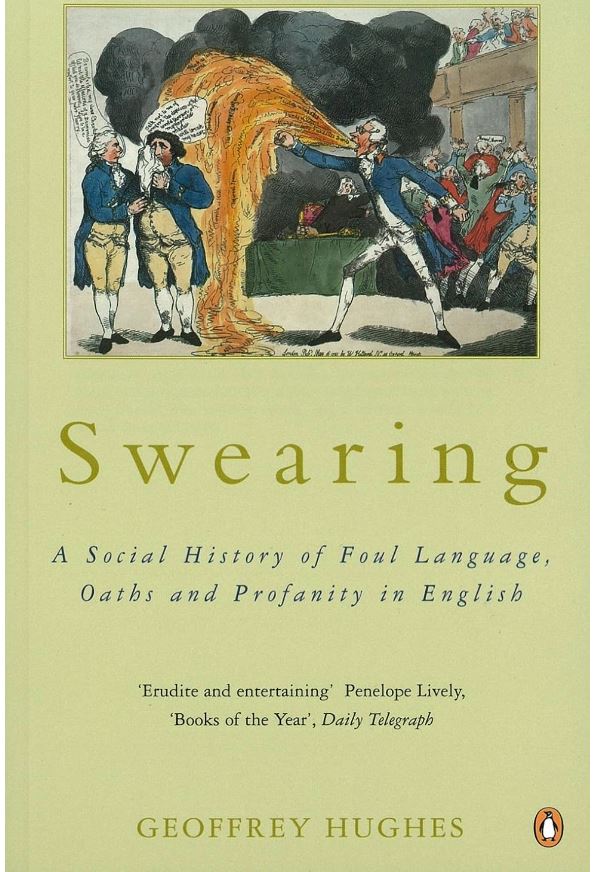
No, really? Swearing can have positive effects?
According to the BBC, “It turns out that swearing helps mitigate pain. It is easier to keep an arm in ice-cold-water for longer if you are simultaneously effing and blinding [using very strong swear words].”
Cursing out loud also appears to increase power and strength during physical exertion. It’s not clear why that is, but research shows that “Swearing produces a hypoalgesic effect [decreased sensitivity to pain], increasing pain tolerance and pain threshold, while reducing pain perception.”
The BBC article continues: “Swearing can boast other benefits. The claim has been made that swearing is bonding: a few blue words, uttered in a good-natured way, indicates and encourages intimacy” as well as affiliation and solidarity. This is known as “social swearing.” “And those who speak more than one language report that swearing in their first language is more satisfying, carrying, as it does, a bigger emotional punch.”
Swearing is defined as “the use of specific, negatively charged and often emotionally loaded terms, which are taboo in a given language/culture. … It’s the use of words that have the potential to be offensive, inappropriate, objectionable, or unacceptable in any given social context.” So it’s powerful.
 It’s an emotional force. Motorist, for instance report “using swearing both to express verbal aggression, and as a form of catharsis that enabled them to cope with feelings of anger in stressful road situations,” as described in the paper, “The power of swearing: What we know and what we don’t.” One conclusion is that “swearing provides a uniquely potent means of both achieving catharsis and conveying the speaker’s emotional state to others.” Its purpose can be to express joy, excitement, and surprise, not just fear, anger, or annoyance.
It’s an emotional force. Motorist, for instance report “using swearing both to express verbal aggression, and as a form of catharsis that enabled them to cope with feelings of anger in stressful road situations,” as described in the paper, “The power of swearing: What we know and what we don’t.” One conclusion is that “swearing provides a uniquely potent means of both achieving catharsis and conveying the speaker’s emotional state to others.” Its purpose can be to express joy, excitement, and surprise, not just fear, anger, or annoyance.
It can be used for verbal emphasis. A message can be made more emphatic or engaging using curse words, and they increase attention and concentration. The taboo nature of profanity appears to increase its potential for achieving positive interpersonal effects. What’s more, since uttering profanities is not possible in most settings, the use of expletives is often used in informal and relaxed, permissive environments. In these contexts, cursing expressed in a light-hearted manner and with a sense of humor seems to increase strength and stamina and can increase self-confidence and risk-taking behavior.
So, it transpires that using offensive language or swearing can be very liberating. It can “help individuals process emotions, establish social bonds, and express their feelings in certain contexts,” as summarized by medical publisher Psychiatrist.com.
That means that Mark Twain wasn’t full of S#!T when he declared:
Under certain circumstances, profanity provides a relief denied even to prayer.”
| Cookie | Duration | Description |
|---|---|---|
| cookielawinfo-checbox-analytics | 11 months | This cookie is set by GDPR Cookie Consent plugin. The cookie is used to store the user consent for the cookies in the category "Analytics". |
| cookielawinfo-checbox-functional | 11 months | The cookie is set by GDPR cookie consent to record the user consent for the cookies in the category "Functional". |
| cookielawinfo-checbox-others | 11 months | This cookie is set by GDPR Cookie Consent plugin. The cookie is used to store the user consent for the cookies in the category "Other. |
| cookielawinfo-checkbox-necessary | 11 months | This cookie is set by GDPR Cookie Consent plugin. The cookies is used to store the user consent for the cookies in the category "Necessary". |
| cookielawinfo-checkbox-performance | 11 months | This cookie is set by GDPR Cookie Consent plugin. The cookie is used to store the user consent for the cookies in the category "Performance". |
| viewed_cookie_policy | 11 months | The cookie is set by the GDPR Cookie Consent plugin and is used to store whether or not user has consented to the use of cookies. It does not store any personal data. |

It was a pleasure reading this interesting and thorough article. Great post.
Sorry I don’t find this good news at all. I am sure violence can be viewed by some as cathartic. What needs to be encouraged is our personal ability to cope with a situation with respect to those around us. We don’t swear in public in sports like tennis, golf and other sports like rugby. We are brought to more base behavior by other sports and its hooligans. We condone more and more the ill-bred attitude of our time. So not a celebration to me, just again misplaced values and a waste of researchers’ time and money.
An excellent rebuttal.
Psychological scientists seem to agree that it’s important to study swearing, not least because it “can occur with any emotion and yield positive or negative outcomes.” Although it’s a bit dated, the following article makes relevant points: https://www.psychologicalscience.org/observer/the-science-of-swearing. Interestingly, it states that, “Most public uses of taboo words are not in anger; they are innocuous or produce positive consequences (e.g., humor elicitation),” although that may not be the case regarding swearing in private settings. The question of whether our permissive society is getting “worse” with respect to swearing is intriguing. It’s also touched upon in the article.
Thank you for your thought-provoking comment. Indeed, evidence abounds on the incivility of swearing, which can definitely be antisocial, rude and/or disrespectful.